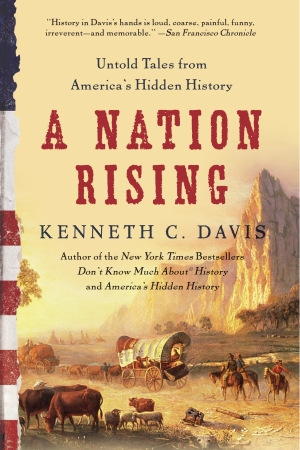
#10 Wall Street Journal Bestseller List
Davis is a fine writer who uses a fast-moving narrative to tell these stories well.
Following his New York Times bestseller America’s Hidden History, Kenneth C. Davis explores the gritty first half of the nineteenth century—among the most tumultuous periods in this nation’s short life.
In the dramatic period that spans roughly from 1800 through 1850, the United States emerged from its inauspicious beginning as a tiny newborn nation, struggling for survival and political cohesion on the Atlantic seaboard, to a near-empire that spanned the continent. It was a time in which the “dream of our founders” spread in ways that few men of that Revolutionary Generation could possibly have imagined. And it was an era that ultimately led to the great, tragic conflagration that followed—the American Civil War.The narratives that form A Nation Rising each exemplify the “hidden history” of America, exploring a vastly more complex path to nationhood than the tidily packaged national myth of a destiny made manifest by visionary political leaders and fearless pioneers. Instead, Davis (whose writing People magazine compared to “returning to the classroom of the best teacher you ever had”) explores many historical episodes that reverberate to this day, including Aaron Burr’s 1807 trial, showcasing the political intrigue of the early Republic and becoming one of our nation’s first media circuses an 1813 Indian uprising and an ensuing massacre that exposes the powerful conflicts at the heart of America’s expansion a mutiny aboard the slave ship Creole and the ways in which the institution of slavery both destroyed lives and warped our nation’s founding the “Dade Massacre” and the start of the second Seminole War, a long, deadly conflict between Indian tribes, their African American allies, and the emergent U.S. Army the bloody “Bible Riots” in Philadelphia, demonstrating how deadly anti-immigrant sentiment could be the story of Jessie Benton Frémont and Lt. John C. Frémont, a remarkable couple who together helped open the West, bring California into the Union, and gave literal shape to the nation today The issues raised in these intertwined stories—ambition, power, territorial expansion, slavery, intolerance, civil rights, freedom of the press—continue to make headlines. The resulting book is not only riveting storytelling in its own right, but a stirring reminder of the ways in which our history continues to shape our present.
Davis is a widely read author and a contributor to National Public Radio. He has made a career out of writing about the supposedly “hidden” truths that transcend the mythology about American history. Here, he offers a series of essays that covers the period from 1800 to 1850, which witnessed massive territorial expansion, controversy over slavery, and efforts to forge a national identity. Incidents covered include the trial of Aaron Burr for treason, the Seminole War in Florida, a slave uprising in Louisiana, and anti-Catholic riots in Philadelphia. Professional historians may cringe at Davis’ claims of revealing hidden truths, given that virtually all of these topics are familiar to scholars. Still, Davis is a fine writer who uses a fast-moving narrative to tell these stories well. He knows his facts, and his assertions and speculations are generally credible. For general readers who wish to expand their knowledge of the period, this is an informative and enjoyable work.
Summer Non Fiction Reading